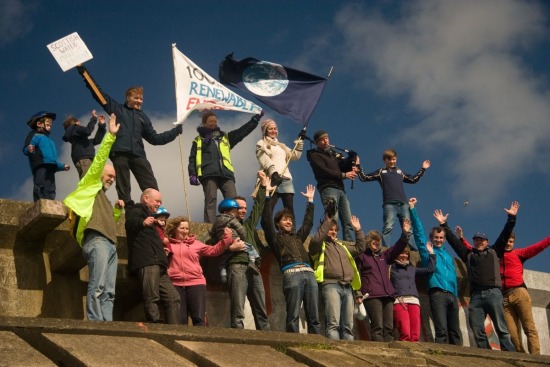Scottish Government must act to allow Portobello and Leith wind project to go ahead

One of the most exciting things I’ve been involved with in my time in Edinburgh is the proposal for a community owned wind turbine. The turbine would be shared between communities in Portobello and Leith. It would be the first community-owned, revenue generating urban wind turbine in the UK, if it gets the go-ahead.
And it was all looking set for the go-ahead until we ran into an inglorious episode of corporate finger pointing and risk aversion. The fact that there are three different organisations involved in running the site seems to offer all of them the opportunity to avoid any risk, however minor.
The site (Seafield Waste Water Treatment Works) has ample wind and looks like it will have little impact on residential properties. But the Private Finance Initiative (PFI) funding agreement has created such a complex management relationship that a fantastic opportunity to raise money for the community and generate clean energy is going to be missed.
Our experience points to several conclusions. The first is that unless the Scottish Government takes action now, we as a nation are going to miss every opportunity to generate renewable power on a PFI site. Every PFI school that wants to install solar panels and every PFI hospital that wants to reduce its bills by adding renewables will be prevented from doing so.
Both Greener Leith and PEDAL -> Portobello Transition Town have worked hard to ensure that this project works. We’ve been rebuffed just as we are about to take the project to the final stage of approval for the site.
The reason we have been refused the opportunity to take our project to completion is that there is a risk that the turbine might fail and damage some of the waste water treatment works. The chances of the turbine failing are in themselves tiny. The chances that that failure will result in any damage to the works are infinitesimal.
We need the Scottish Government to make this a priority. The Government is always keen to point out that Scotland’s economic future will be built on renewables. Shutting communities, schools and hospitals out of using PFI sites for renewables because corporate executives lack imagination is a terribly high price to pay.
There are a number of ways in which the Government could solve this problem, by directing Scottish Water, or by underwriting the tiny risk to those running the Seafield site. Each has its merits. But one thing is certain: Scottish Government can solve the problem, and they must solve it so that Scotland’s communities can benefit from the renewables revolution.

Leave a Reply